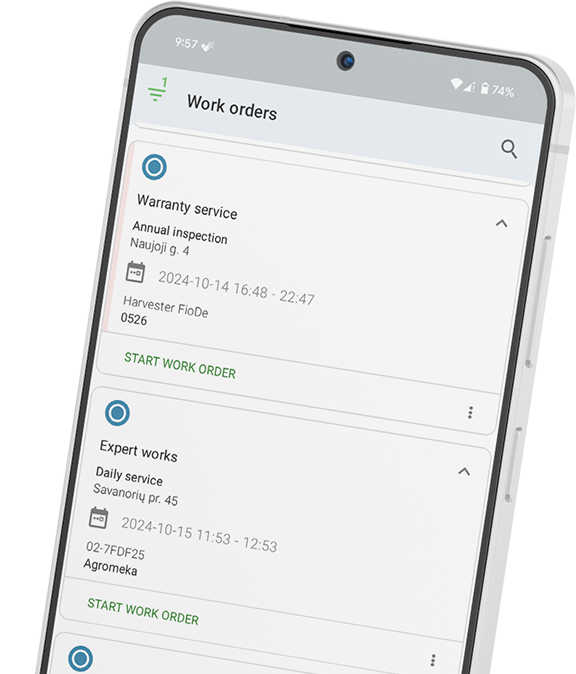Bring simplicity to your field service operations.
Our list of integrations is updated frequently. Explore each integration in its own separate page for more information.
In today’s fast-paced business environment, efficient management means leveraging software assistance, memory storage, and automation to achieve far more than traditional methods ever could. This shift allows companies to streamline operations, enhance productivity, and make data-driven decisions that keep them competitive. Meanwhile, bureaucracy and repetitive manual tasks are delegated to machines that excel at handling one-dimensional work.
For heavy equipment dealerships, the need for software assistance is even bigger. Complex inventory management, extensive parts catalogs, specialized service operations, and high-value customer relationships that require precise tracking need proper handling to avoid heavy equipment issues and depreciation. In a situation where so many variables can make or break the dealership’s success, staying mindful of available machines, parts, and quantities is crucial for client retention and lowering costs.
Because heavy equipment consists of many complex parts, dealers have to maintain much tighter business-to-client (B2C) relationships for swift delivery of repairs and replacement parts. As digital data continues to revolutionize the modern workplace, information has become the foundation on which companies structure their entire infrastructure, and heavy equipment dealerships are no exception.
In this guide, we will discuss how the right dealership management software can improve customer satisfaction and increase equipment sales by modernizing the business infrastructure. Let’s take a closer look at how dealer management systems and their integration can help you climb the ranks within the industry.
Modern dealership management provides massive assistance by relaying data-oriented tasks to automated software. Then, with the help of a digital device, employees can access the server and check all variables without double-checking or manually logging inventory levels, tracking customer interactions, or managing service schedules, ultimately enhancing efficiency and most importantly – reducing human error.
With the help of digital automation, service technicians can stay updated on equipment health with the help of sensors, a massive transformation within the industry. On top of that, dealership management software often runs on remote cloud servers, helping workers access servicing history from any location while testing the functionality of heavy equipment.
The best DMS is the one that is dynamic enough to adapt to the ever-changing needs of your dealership. Let’s take a look at the most important factors of the management software that save hours of time and save a ton of human resources.
Efficient management is essential for heavy equipment dealerships to succeed and stay competitive, especially in industries with such expensive products and many moving parts. A dealership management system centralizes all aspects of the business, streamlines operations, and improves efficiency with an all-in-one solution.
Such systems can help heavy equipment dealerships improve their management processes, leading to increased efficiency and productivity. By simplifying inventory management, parts tracking, and service operations to equipment dealer management software, technicians can minimize damages and maximize equipment downtime. By eliminating a big part of the operational overhead, dealers can focus on enhancing customer relationships and introducing new features to sell more products.
Choosing the right dealership management system can be a real headache when its functionality, support, and available tools will be more or less extensive depending on what your specific business model requires. For heavy equipment dealerships, the key to efficient operations and informed decision-making starts with fluid inventory management.
The ideal system should be user-friendly, scalable, and customizable, with strong integration capabilities. After its introduction, employees should finish a training course that explains the main parts of the dealer management software, especially the functionality in areas that impact their jobs directly.
In some cases, using a standalone DMS may not cover the essential improvements for your business model. That is why some dealers prefer to combine it with features within the Field Service Management (FSM) software. For example, with additional functionality and important data tracking from FMSs like Frontu, dealers can incorporate monitoring of field operations and real-time communication to provide support as quickly as possible.
Implementation and training are crucial elements for heavy equipment dealerships to maximize their DMS benefits, requiring both initial setup support and ongoing training. Once all employees can effectively use the system. A successful implementation should include comprehensive updates and support programs to maintain long-term system effectiveness.
Cloud-based solutions give heavy equipment dealerships a complete management system so technicians can do their job and study potential solutions with real-time data access at their disposal.e. While this approach creates new costs in digital infrastructure management, the result costs less money than traditional systems via reduction of used hardware while maintaining high performance across all business operations.
Customer relationship management (CRM) is critical for heavy equipment dealerships to build strong relationships with their customers because a lot of revenue comes from repairs and it’s not every day that a dealership sells complex and costly machines. A good CRM system CRM is built right into the DMS because it helps dealerships keep all customer info in one place – from contact details to sales history and service records.
CRM integration makes it easier to track customer interactions and make smart business decisions based on real-time data. With less overhead on monotonous tasks, dealers can dedicate more resources to provide better service and build stronger relationships.
In 2025, heavy equipment dealerships cannot operate without management software solutions that integrate automation, centralized data management, and real-time analytics to enhance all business decisions. Thanks to digital assistance, operations like inventory, parts tracking, and service scheduling no longer require human resources to achieve peak efficiency. By leveraging powerful dealership management systems, often combined with field service capabilities, cloud support, and CRM, dealers can reduce manual tasks, enhance customer relationships, and remain competitive in a very demanding industry.

Our list of integrations is updated frequently. Explore each integration in its own separate page for more information.

Link copied!